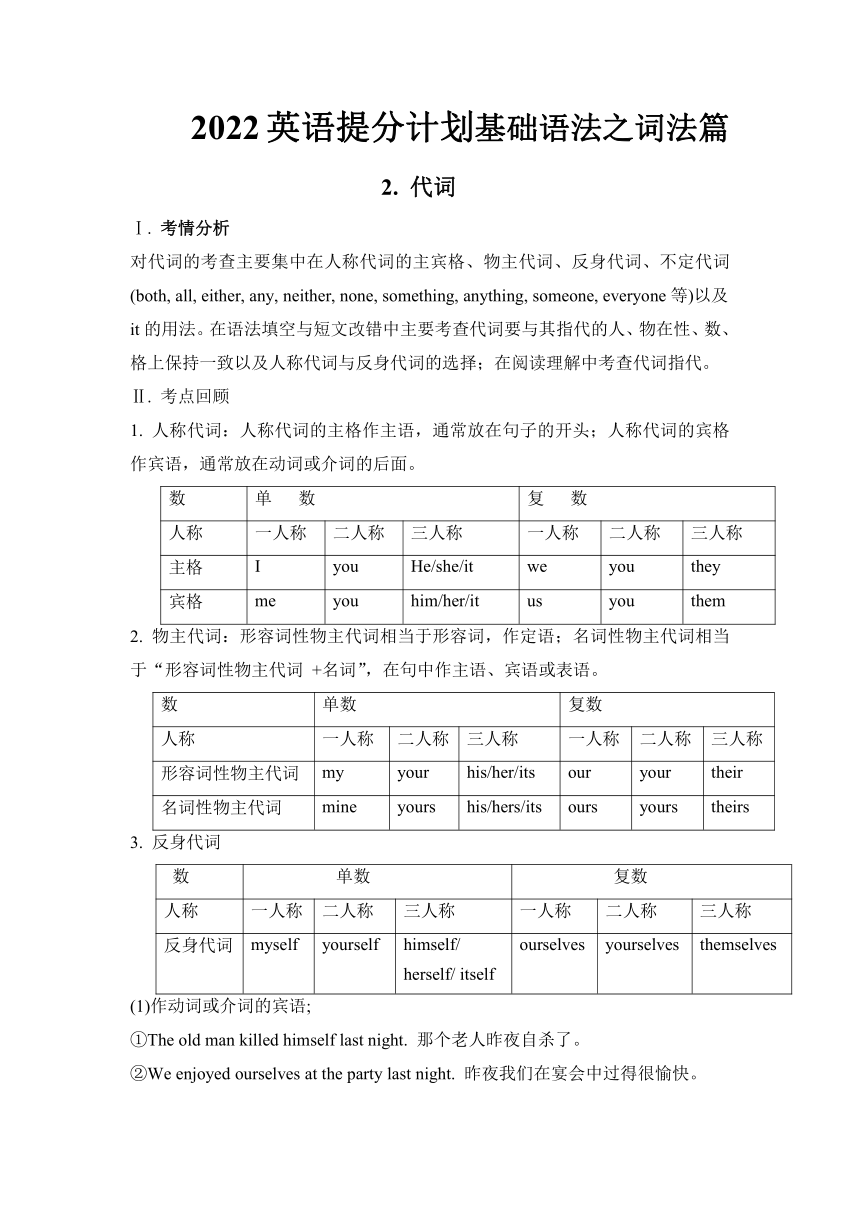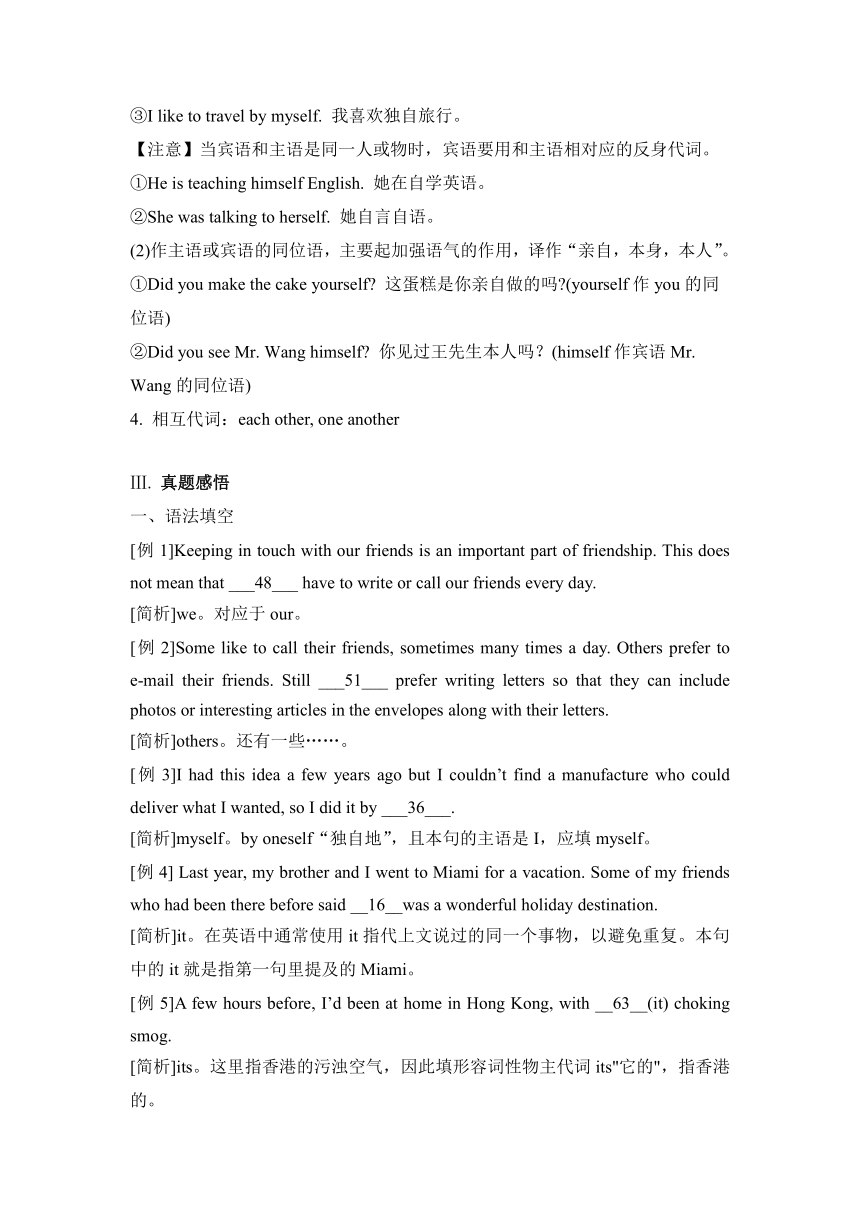2022年高考英语二轮复习:代词学案(含答案)
文档属性
| 名称 | 2022年高考英语二轮复习:代词学案(含答案) |  | |
| 格式 | docx | ||
| 文件大小 | 28.1KB | ||
| 资源类型 | 教案 | ||
| 版本资源 | 通用版 | ||
| 科目 | 英语 | ||
| 更新时间 | 2022-04-06 18:50:10 | ||
图片预览


文档简介
2022英语提分计划基础语法之词法篇
2. 代词
Ⅰ. 考情分析
对代词的考查主要集中在人称代词的主宾格、物主代词、反身代词、不定代词(both, all, either, any, neither, none, something, anything, someone, everyone等)以及it的用法。在语法填空与短文改错中主要考查代词要与其指代的人、物在性、数、格上保持一致以及人称代词与反身代词的选择;在阅读理解中考查代词指代。
Ⅱ. 考点回顾
1. 人称代词:人称代词的主格作主语,通常放在句子的开头;人称代词的宾格作宾语,通常放在动词或介词的后面。
数 单 数 复 数
人称 一人称 二人称 三人称 一人称 二人称 三人称
主格 I you He/she/it we you they
宾格 me you him/her/it us you them
2. 物主代词:形容词性物主代词相当于形容词,作定语;名词性物主代词相当于“形容词性物主代词 +名词”,在句中作主语、宾语或表语。
数 单数 复数
人称 一人称 二人称 三人称 一人称 二人称 三人称
形容词性物主代词 my your his/her/its our your their
名词性物主代词 mine yours his/hers/its ours yours theirs
3. 反身代词
数 单数 复数
人称 一人称 二人称 三人称 一人称 二人称 三人称
反身代词 myself yourself himself/ herself/ itself ourselves yourselves themselves
(1)作动词或介词的宾语;
①The old man killed himself last night. 那个老人昨夜自杀了。
②We enjoyed ourselves at the party last night. 昨夜我们在宴会中过得很愉快。
③I like to travel by myself. 我喜欢独自旅行。
【注意】当宾语和主语是同一人或物时,宾语要用和主语相对应的反身代词。
①He is teaching himself English. 她在自学英语。
②She was talking to herself. 她自言自语。
(2)作主语或宾语的同位语,主要起加强语气的作用,译作“亲自,本身,本人”。
①Did you make the cake yourself 这蛋糕是你亲自做的吗 (yourself作you的同位语)
②Did you see Mr. Wang himself 你见过王先生本人吗?(himself作宾语Mr. Wang的同位语)
4. 相互代词:each other, one another
Ⅲ. 真题感悟
一、语法填空
[例1]Keeping in touch with our friends is an important part of friendship. This does not mean that ___48___ have to write or call our friends every day.
[简析]we。对应于our。
[例2]Some like to call their friends, sometimes many times a day. Others prefer to e-mail their friends. Still ___51___ prefer writing letters so that they can include photos or interesting articles in the envelopes along with their letters.
[简析]others。还有一些……。
[例3]I had this idea a few years ago but I couldn’t find a manufacture who could deliver what I wanted, so I did it by ___36___.
[简析]myself。by oneself“独自地”,且本句的主语是I,应填myself。
[例4] Last year, my brother and I went to Miami for a vacation. Some of my friends who had been there before said __16__was a wonderful holiday destination.
[简析]it。在英语中通常使用it指代上文说过的同一个事物,以避免重复。本句中的it就是指第一句里提及的Miami。
[例5]A few hours before, I’d been at home in Hong Kong, with __63__(it) choking smog.
[简析]its。这里指香港的污浊空气,因此填形容词性物主代词its"它的",指香港的。
[例6] When I ask him to please put down the phone and stop ignoring me, he says, “ In a minute,” but still checks to see if __38__ has posted something new on the internet.
[简析]someone/somebody。根据语境“他依然在查看是否有人在网上发布新的消息”可知,应填不定代词someone/somebody。
[例7] Another nice thing is that you learn both new words and __64__(they) use unconsciously, meaning that you will tend to use the words learned this way in conversations almost automatically.
[简析]their。此句意为“另一个好处是你不知不觉中学习到了新词和它们的用法”,use在此处是名词,故用形容词性物主代词their作定语。
[例8] One cup of coffee in the late afternoon or evening will cause __61__(they) to stay awake almost all night.
[简析]them 考查代词。cause sb. to do sth.意为“使某人做某事”,人称代词作动词宾语时要用宾格形式。
[例9]Many westerners who come to China cook much less than in their own countries once they realize how cheap ___58___ can be to eat out.
[简析]it。在宾语从句中,it用作形式主语,替代真正的动词不定式主语to eat out。
[例10] Nervously facing challenges, I know I will whisper to __3__(I) the two simple words “Be yourself”.
[简析]myself。
二、短文改错
Ⅰ. 代词格的选择。
[例1]Three years ago, Li Meng’s parents invited I to spend two wonderful weeks in Qingdao with them during the summer holiday.
[简析]I →me。动词invited后跟人称代词宾格作宾语。
[例2]After we left, I said, “That was very nice of you, Mother. But I didn’t think she looked like Grandma.” “Neither did me.” said Mother cheerfully.
[简析]me →I。本句是倒装句“ Neither + did +主语”。
Ⅱ. 代词性的选择。
[例3]Dad cleaned the house, and then went shopping. When he came back, I found a bunch of flowers in her hand.
[简析]her →his。花在父亲(男性)手里。
[例4]Every time he arrived home at the end of the day, we’d greet her at the door. He would ask who we were and pretend not to know us.
[简析]her →him。句子主语he 是男性。
Ⅲ. 代词数的选择。
[例5]I was happy when the toys worked, but when things did go wrong, I got angry and broke it.
[简析]it →them。玩具the toys是复数。
[例6]Close to the school there was a beautiful park with many trees around them.
[简析]them →it。a beautiful park“一个美丽的公园”是单数。
Ⅳ. 代词人称的选择。
[例7]Many countries in the world find we don’t have enough water. (2012·全国Ⅱ卷)
[简析]we →they。主句主语Many countries 是第三人称,故宾语从句中主语用they。
[例8]My uncle says that he never dreams of becoming rich in a short period of time. Instead, he hopes that our business will grow steadily.
[简析]our →his。主句主语he是第三人称,故宾语从句中用his修饰名词business,此处指“他的生意”。
[例9]If we go on a trip abroad, we can broaden your view and gain knowledge we cannot get from books.
[简析]your →our。主句主语we 是第一人称,故用our修饰名词view。
[例10]At first, I thought I knew everything and could make decisions by yourself.
[简析]yourself →myself。主句主语I 是第一人称,故用反身代词myself作介词by的宾语。
Ⅴ. 人称代词与物主代词的选择。
[例11]It is such a great hotel that I would recommend it to any friend of me who is going to Beijing.
[简析]me →mine。本句是双重所有格句式,介词后跟名词性物主代词。
[例12]I’m sorry that I am abroad and can’t send your flowers, so I’m writing to you. (2012·四川卷)
[简析]your →you。动词send后跟双宾语,故用人称代词宾格作间接宾语。
[例13]We took ours fishing poles and headed for the lake.
[简析]ours →our。修饰名词fishing poles,要用形容词性物主代词。
Ⅵ. 人称代词与反身代词的选择。
[例14]Just at that time I woke up and found me still in bed!
[简析]me →myself。句子主语是I,故用反身代词作宾语。
[例15]He had a deep voice, which set himself apart from others in our small town, and he was strong and powerful.
[简析]himself →him。在非限制性定语从句中,主语是主句内容“He had a deep voice”,故用人称代词宾格作宾语。
Ⅶ. 其它
[例16]I have a good friend who’s name is Liu Mei.
[简析]who’s →whose。whose引导定语从句,修饰先行词a good friend,而who’s相当于who is或who has。
[例17]In our Greece unit, we have been learning about it’s rich culture and long history.
[简析]it’s →its。形容词性物主代词its修饰名词rich culture and long history,而it’s相当于it is或it has。
[例18]I hope I can be a bridge between China and others countries in the future.
[简析]others →other。形容词other修饰名词countries,而others相当于other +名词复数。
2. 代词
Ⅰ. 考情分析
对代词的考查主要集中在人称代词的主宾格、物主代词、反身代词、不定代词(both, all, either, any, neither, none, something, anything, someone, everyone等)以及it的用法。在语法填空与短文改错中主要考查代词要与其指代的人、物在性、数、格上保持一致以及人称代词与反身代词的选择;在阅读理解中考查代词指代。
Ⅱ. 考点回顾
1. 人称代词:人称代词的主格作主语,通常放在句子的开头;人称代词的宾格作宾语,通常放在动词或介词的后面。
数 单 数 复 数
人称 一人称 二人称 三人称 一人称 二人称 三人称
主格 I you He/she/it we you they
宾格 me you him/her/it us you them
2. 物主代词:形容词性物主代词相当于形容词,作定语;名词性物主代词相当于“形容词性物主代词 +名词”,在句中作主语、宾语或表语。
数 单数 复数
人称 一人称 二人称 三人称 一人称 二人称 三人称
形容词性物主代词 my your his/her/its our your their
名词性物主代词 mine yours his/hers/its ours yours theirs
3. 反身代词
数 单数 复数
人称 一人称 二人称 三人称 一人称 二人称 三人称
反身代词 myself yourself himself/ herself/ itself ourselves yourselves themselves
(1)作动词或介词的宾语;
①The old man killed himself last night. 那个老人昨夜自杀了。
②We enjoyed ourselves at the party last night. 昨夜我们在宴会中过得很愉快。
③I like to travel by myself. 我喜欢独自旅行。
【注意】当宾语和主语是同一人或物时,宾语要用和主语相对应的反身代词。
①He is teaching himself English. 她在自学英语。
②She was talking to herself. 她自言自语。
(2)作主语或宾语的同位语,主要起加强语气的作用,译作“亲自,本身,本人”。
①Did you make the cake yourself 这蛋糕是你亲自做的吗 (yourself作you的同位语)
②Did you see Mr. Wang himself 你见过王先生本人吗?(himself作宾语Mr. Wang的同位语)
4. 相互代词:each other, one another
Ⅲ. 真题感悟
一、语法填空
[例1]Keeping in touch with our friends is an important part of friendship. This does not mean that ___48___ have to write or call our friends every day.
[简析]we。对应于our。
[例2]Some like to call their friends, sometimes many times a day. Others prefer to e-mail their friends. Still ___51___ prefer writing letters so that they can include photos or interesting articles in the envelopes along with their letters.
[简析]others。还有一些……。
[例3]I had this idea a few years ago but I couldn’t find a manufacture who could deliver what I wanted, so I did it by ___36___.
[简析]myself。by oneself“独自地”,且本句的主语是I,应填myself。
[例4] Last year, my brother and I went to Miami for a vacation. Some of my friends who had been there before said __16__was a wonderful holiday destination.
[简析]it。在英语中通常使用it指代上文说过的同一个事物,以避免重复。本句中的it就是指第一句里提及的Miami。
[例5]A few hours before, I’d been at home in Hong Kong, with __63__(it) choking smog.
[简析]its。这里指香港的污浊空气,因此填形容词性物主代词its"它的",指香港的。
[例6] When I ask him to please put down the phone and stop ignoring me, he says, “ In a minute,” but still checks to see if __38__ has posted something new on the internet.
[简析]someone/somebody。根据语境“他依然在查看是否有人在网上发布新的消息”可知,应填不定代词someone/somebody。
[例7] Another nice thing is that you learn both new words and __64__(they) use unconsciously, meaning that you will tend to use the words learned this way in conversations almost automatically.
[简析]their。此句意为“另一个好处是你不知不觉中学习到了新词和它们的用法”,use在此处是名词,故用形容词性物主代词their作定语。
[例8] One cup of coffee in the late afternoon or evening will cause __61__(they) to stay awake almost all night.
[简析]them 考查代词。cause sb. to do sth.意为“使某人做某事”,人称代词作动词宾语时要用宾格形式。
[例9]Many westerners who come to China cook much less than in their own countries once they realize how cheap ___58___ can be to eat out.
[简析]it。在宾语从句中,it用作形式主语,替代真正的动词不定式主语to eat out。
[例10] Nervously facing challenges, I know I will whisper to __3__(I) the two simple words “Be yourself”.
[简析]myself。
二、短文改错
Ⅰ. 代词格的选择。
[例1]Three years ago, Li Meng’s parents invited I to spend two wonderful weeks in Qingdao with them during the summer holiday.
[简析]I →me。动词invited后跟人称代词宾格作宾语。
[例2]After we left, I said, “That was very nice of you, Mother. But I didn’t think she looked like Grandma.” “Neither did me.” said Mother cheerfully.
[简析]me →I。本句是倒装句“ Neither + did +主语”。
Ⅱ. 代词性的选择。
[例3]Dad cleaned the house, and then went shopping. When he came back, I found a bunch of flowers in her hand.
[简析]her →his。花在父亲(男性)手里。
[例4]Every time he arrived home at the end of the day, we’d greet her at the door. He would ask who we were and pretend not to know us.
[简析]her →him。句子主语he 是男性。
Ⅲ. 代词数的选择。
[例5]I was happy when the toys worked, but when things did go wrong, I got angry and broke it.
[简析]it →them。玩具the toys是复数。
[例6]Close to the school there was a beautiful park with many trees around them.
[简析]them →it。a beautiful park“一个美丽的公园”是单数。
Ⅳ. 代词人称的选择。
[例7]Many countries in the world find we don’t have enough water. (2012·全国Ⅱ卷)
[简析]we →they。主句主语Many countries 是第三人称,故宾语从句中主语用they。
[例8]My uncle says that he never dreams of becoming rich in a short period of time. Instead, he hopes that our business will grow steadily.
[简析]our →his。主句主语he是第三人称,故宾语从句中用his修饰名词business,此处指“他的生意”。
[例9]If we go on a trip abroad, we can broaden your view and gain knowledge we cannot get from books.
[简析]your →our。主句主语we 是第一人称,故用our修饰名词view。
[例10]At first, I thought I knew everything and could make decisions by yourself.
[简析]yourself →myself。主句主语I 是第一人称,故用反身代词myself作介词by的宾语。
Ⅴ. 人称代词与物主代词的选择。
[例11]It is such a great hotel that I would recommend it to any friend of me who is going to Beijing.
[简析]me →mine。本句是双重所有格句式,介词后跟名词性物主代词。
[例12]I’m sorry that I am abroad and can’t send your flowers, so I’m writing to you. (2012·四川卷)
[简析]your →you。动词send后跟双宾语,故用人称代词宾格作间接宾语。
[例13]We took ours fishing poles and headed for the lake.
[简析]ours →our。修饰名词fishing poles,要用形容词性物主代词。
Ⅵ. 人称代词与反身代词的选择。
[例14]Just at that time I woke up and found me still in bed!
[简析]me →myself。句子主语是I,故用反身代词作宾语。
[例15]He had a deep voice, which set himself apart from others in our small town, and he was strong and powerful.
[简析]himself →him。在非限制性定语从句中,主语是主句内容“He had a deep voice”,故用人称代词宾格作宾语。
Ⅶ. 其它
[例16]I have a good friend who’s name is Liu Mei.
[简析]who’s →whose。whose引导定语从句,修饰先行词a good friend,而who’s相当于who is或who has。
[例17]In our Greece unit, we have been learning about it’s rich culture and long history.
[简析]it’s →its。形容词性物主代词its修饰名词rich culture and long history,而it’s相当于it is或it has。
[例18]I hope I can be a bridge between China and others countries in the future.
[简析]others →other。形容词other修饰名词countries,而others相当于other +名词复数。
